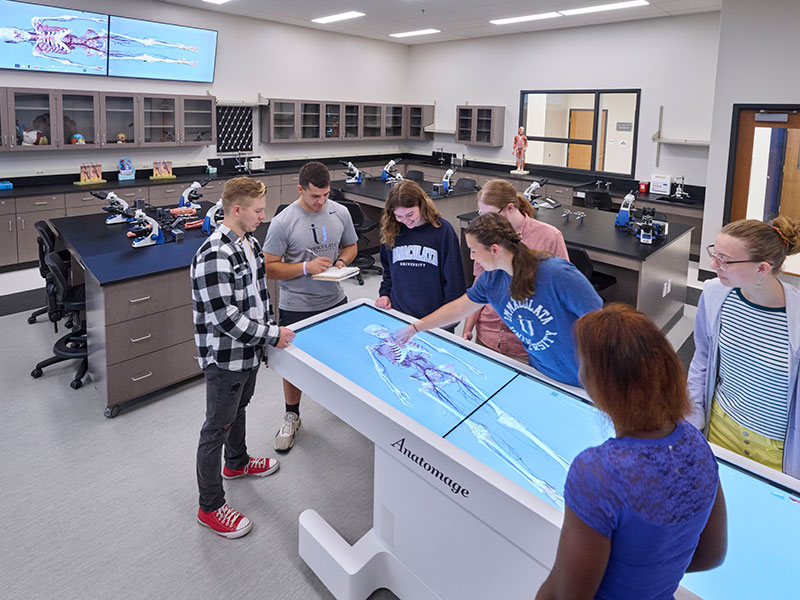Allied Health, B.S.
The B.S. in allied health clinical specialties program, in association with affiliate institutions, prepares you for licensure/credentialing in your chosen clinical specialty area.
You will receive an introduction to various allied health disciplines to help you understand the differences between clinical specialties and the challenges and opportunities in each area. This exploration will help you decide which clinical specialty to pursue and which affiliate institution to apply to for your clinical training.
Immaculata’s allied health curriculum will prepare you to exercise critical thinking and problem-solving skills in health care management and patient care. You will learn about the underlying causes of illness and the factors that contribute to health and wellness. You will practice effective communication and use of information technology to collaborate with patients, health care team members, and health care organizations.
At A Glance
Program: Bachelor of Science
Audience: Undergraduate students
Format: Face-to-face classes
Next Start Date: August 26, 2024
Cost: Full-time tuition
Time to Completion Four years (3 at IU and 1-2 at affiliated schools, depending on clinical specialty)
"The fantastic professors at Immaculata taught me not only the basics of my career, but also the importance of thinking strategically and creatively. My professors knew me on a personal level, which made learning much easier and more pleasant. As a nuclear medicine technologist at Penn State Hershey Medical Center, I am using the skills Immaculata taught me daily. As I was preparing for Thomas Jefferson University, my professor shared her experiences in the medical field with my class and prepared us for the big challenges approaching. She even brought recent graduates from the program back to IU to speak and answer our questions."
Desiree Dinko '20
Nuclear Medicine Technologist at Milton S. Hershey Medical Center
Career Outlook
According to the Bureau of Labor and Statistics, employment in the allied health professions is projected to increase by more than 20% over the next decade, faster than the average growth for all occupations. While an associate degree is often the minimum requirement for becoming a licensed allied health professional, a bachelor’s degree is increasingly necessary and will give you an advantage in your career. Our recent graduates have gotten jobs as radiologic technologists, cardiac sonographers, and pharmacy technicians. They have also been accepted to graduate programs in pharmacology and health care management.
- Immaculata has strong relationships with local hospitals, where you will observe and complete volunteer work to experience the operations of a health care facility.
- During your coursework, guest speakers will help you further understand different medical professions and the institutions where you can transfer for your clinical training.
- Our faculty will coach you as you prepare to apply to affiliate institutions for the clinical portion of your education.
- You may be interested in minoring in health care management in order to diversify your skills and prepare for a supervisory role in a health care organization.
Clinical Specialty Concentrations
- Cardiac Sonography
- Cardiovascular Technology
- Diagnostic Medical Sonography
- Medical Laboratory Science
- Nuclear Medicine Technology
- Pre-Pharmacy
- Respiratory Therapy Technician
- Radiology Technician
- Surgical Technician
- Vascular Sonography
Once students complete their programs at the affiliated school, those credits are transferred back to Immaculata and the student is awarded a BS degree in Allied Health. The affiliate school helps the student in applying and preparing them to take their national certification test in their specialized concentration upon successful completion of their clinical program.
Students must maintain a 2.3 GPA at Immaculata to stay in the program. Students must apply, be interviewed, and be accepted into one of the affiliate schools for their final year of clinical training. Students must earn at least a B in science and math courses to be considered for admission. Each school has different application deadlines for each of the programs offered.
Clinical Specialties
Within Immaculata’s Allied Health degree program there are 10 concentrations and 6 affiliated schools for clinical training.
Radiology Technician
This program requires 24 months of study beyond the 6 semesters at IU.
- Diagnostic Medical Sonography
Nuclear Medicine
Radiology Technology
All programs are an additional 18 months in length beyond the 6 semesters at Immaculata. All programs begin in June following the student’s junior year.
Most concentrations require 6 semesters at Immaculata, and another 12-18 months of additional clinical training at the affiliate school.
Respiratory Therapy and Surgical Technology are only 5 semesters at Immaculata, but involve some summer classes in order to meet the requirements for transfer.
- Cardiac Sonography
- Cardiovascular Technology
- Diagnostic Medical Sonography
- Medical Laboratory Science
- Radiology Technology
- Respiratory Therapy (5 semesters at IU)
- Surgical Technology (5 semesters at IU)
- Vascular Technology
Medical Laboratory Science
This program requires 11 months of study beyond the 6 semesters at IU.
Doctor of Pharmacy
This concentration requires 6 semesters at IU and 4 additional years of training for the pharmacy program.
Diagnostic Medical Sonography
Requires 18-24 months of clinical study beyond the 6 semesters at IU.
Radiology Technician
Requires 18-24 months of clinical study beyond the 6 semesters at IU.
Just The Facts
0:1
Student to Faculty RatioWith a 10:1 student/faculty ratio, personalized academic attention is a hallmark of Immaculata’s programs.
0+
Academic ProgramsImmaculata's 60+ undergraduate programs and 12+ graduate programs provide career-focused education for in-demand jobs.
0+
Clubs and OrganizationsChoose from more than 30 organizations to build relationships, broaden perspectives and gain leadership experience.
